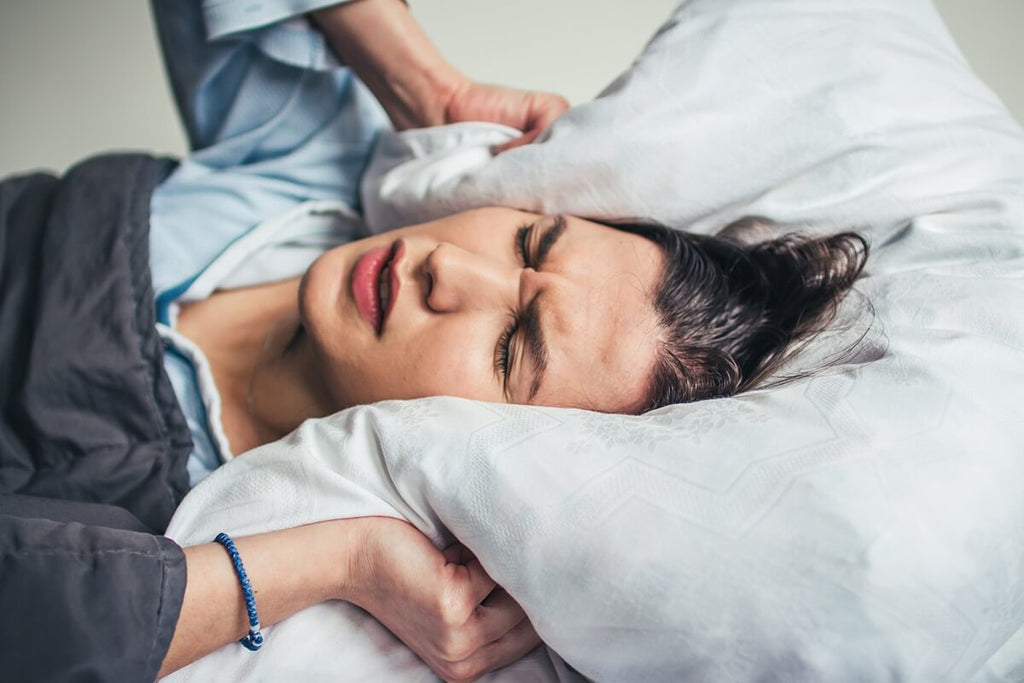What is sleepwalking? Is it dangerous? How does it happen? What should I do if I experience it?
Sleepwalking is a common problem that affects millions of people worldwide.
People who suffer from sleepwalking often don't realize they are awake until they wake up in strange places.
This condition can be dangerous, as sleepwalkers may unknowingly walk into traffic or fall stairs and injure themselves. In severe cases, sleepwalkers have even been known to attack their family members while they are asleep.
According to AASM, up to 4% of the general public suffer from sleepwalking. Children, especially those between the ages of three and seven, are more likely to have it than adults.
It is quite unusual for sleepwalking to continue into adulthood. Sleep deprivation makes it more likely that you will sleepwalk.
There are many misconceptions about this condition. Many people think that sleepwalking is only a child's problem.
However, sleepwalking has also been documented in adults. It is essential to know how to recognize the signs of sleepwalking to avoid potentially fatal accidents.
Here we discuss everything you need to know about sleepwalking – what causes it, how it happens, and how to deal with it.
What Is Sleepwalking?
Sleepwalking is a condition where a person has episodes of walking or acting out dreams during the night.
The condition usually occurs in children and young adults. Although it may seem harmless, sleepwalking can cause serious injury to oneself or others.

How Do You Know If Someone Has Sleepwalked?
The first thing to consider when someone tells you that they have experienced sleepwalking is whether or not it is a natural phenomenon.
Although there have been numerous reports of sleepwalking since ancient times, most doctors believe that it is a rare disorder. There are no specific tests for diagnosing sleepwalking, but some symptoms include:
- Being unable to remember events that occurred during sleep (usually after waking)
- Walking around without realizing where they are going
- Going into another room without remembering why
- Falling over objects and injuring oneself
- Wandering away from home or other familiar locations
- Confusion about time and place
- Talking aloud without knowing that one is doing so
- Not being able to recall anything that happened during the night
People who experience sleepwalking usually have regular sleeping patterns, although they might feel tired and groggy upon awakening.
They will usually have no memory of having had any dreams during the previous night.
If you suspect that your loved one may have suffered from sleepwalking, here are some things to keep an eye out for:
- Does your loved one seem confused about where they are at specific points in the day?
- Is your loved one acting strangely or behaving abnormally?
- Are there any changes in their behaviour? For example, would your loved one suddenly become violent or aggressive?
- Does your loved one ever go missing?
- Does your loved one talk aloud to themself while they sleep?
- Is your loved one afraid of something or someone?
What Causes Sleepwalking?
Although there is still much debate among scientists regarding the exact cause of sleepwalking, several theories exist. Some experts believe that sleepwalking results from genetics, brain chemistry, and environmental influences.
Genetics
Sleepwalking appears to run in families, and researchers believe that genes play a role in causing sleepwalking.
Studies at NIH show that children whose parents have sleep problems tend to display more sleep-related behaviours than those whose parents do not.
Brain Chemistry
Some experts believe that sleepwalking occurs because of abnormalities in the chemicals produced by the body.
This theory suggests that if these chemicals change, then the person could be affected by them. These chemicals are called neurotransmitters, and they control many functions within the body.
The two main neurotransmitter systems involved in sleepwalking are serotonin and norepinephrine.
Serotonin helps regulate mood and arousal levels, while norepinephrine plays a part in regulating attention and alertness.
If either of these neurotransmitters becomes altered, it can affect a person's ability to stay awake and aware. Researchers suggest that low serotonin levels and high levels of norepinephrine could lead to sleepwalking.
Environmental Influences
Experts also believe that sleepwalking is caused by external factors, such as stress, anxiety, depression, and trauma. Stressful situations often trigger sleepwalking episodes in people with this condition.
Research shows that sleepwalkers tend to exhibit more symptoms when under pressure.

What Happens In Your Brain During Sleepwalking?
During sleepwalking, the parts of the brain responsible for controlling consciousness appear to malfunction.
The brain areas most likely to be affected include the thalamus, hypothalamus, amygdala, hippocampus, and basal ganglia.
According to scientists, sleepwalking is caused by two parts of the brain: the limbic region, which deals with unprocessed emotions, and the cortex area, which controls complex motor activity.
The frontal cortex (reason) and hippocampus (memory) are asleep, while other regions would usually dampen their primitive urges — notably the frontal cortex (rationality)
The first two zones, the frontal cortex and hippocampus give off a snoozy delta wave, while the third zone is responsible for our sense of smell and taste and voluntary movement in all four limbs (extended limb syndrome).
Treatment for occasional sleepwalking usually isn't necessary. In children who sleepwalk, it typically goes away by the teen years.
Treatment may be required if sleepwalking results in harm, disrupts family members, or causes embarrassment or sleep disruption for the person who sleepwalks. The goal of treatment is to increase safety and reduce causes or triggers.
How to Treat Sleepwalking?
Treatment may include:
- If sleepwalking is occurring due to sleep deprivation or an underlying sleeping problem or bodily sickness, it should be treated.
- If a person's sleeping disorder is not being treated, or if they appear to be sleepwalking more frequently, the doctor may adjust the dosage. If you think your child's sleepwalking is linked to medication, consult your doctor to understand the implications of medication.
- Medication — such as benzodiazepines or certain antidepressants
- People who are receptive to suggestions while under hypnosis might be able to improve their sleep by learning self-hypnosis — a method in which a deep state of relaxation is achieved through which undesirable behaviour during sleep is discouraged.
- A mental health expert can assist with sleep advice, stress-reduction tactics, self-hypnosis, and relaxation.
Furthermore, try these suggestions if sleepwalking is a problem for you or your child.
Make The Environment Safe.
If sleepwalking has resulted in injuries or might do so in the future, take these precautions: Before going to bed, shut and lock all windows and outside doors. You may even lock inner doors or install alarms or bells on them.
Create a barrier around the entrance or stairway and move electrical cords and other tripping hazards. If possible, sleep on the ground floor.
All weapons should be secured away from reach, and all dangerous or sharp items should be placed out of reach. If your child sleepwalks, don't allow him to sleep in a bunk bed.
Gently Lead The Person Sleepwalking To Bed
You don't have to wake the individual up. Although it's not hazardous for someone to be awakened, it can be disruptive if they become perplexed and irritated.
Get Adequate Sleep
Sleepwalking is more common in those who experience sleep deprivation. Sleep deprivation can lead to tiring out, which may contribute to sleepwalking.
If you're sleep-deprived, consider going to bed an hour earlier, following a more regular sleeping schedule, or taking a short nap for toddlers. Avoiding sleep-time noises and other stimuli that might wake you up.
Establish A Regular, Relaxing Routine Before Bedtime
Nothing ruins a good night's sleep like your partner snoring. Try meditation or other soothing activities before bed to help you relax and unwind. Make the bedroom as relaxing and peaceful as possible for rest.
Put Stress In Its Place
Identify the sources of stress and how to deal with them. Discuss what's troubling you, whether it's a problem at home or elsewhere. If your kid sleepwalks and appears anxious or stressed, speak with them about any issues. A mental health expert can assist.
Look For A Pattern
For a few nights, keep track of — or have someone else in your household keep track of — how many minutes after bedtime you sleepwalk. If the timings are very similar, this data can be beneficial for anticipating awakenings.
Avoid Alcohol
Alcohol has a detrimental impact on sleep, and it might be a cause of sleepwalking.
What Are The Risks Involved With Sleepwalking?
While it is essential to understand what causes sleepwalking so that you can take steps to prevent further occurrences, it is equally important to know how to recognize and treat the condition.
If left untreated, sleepwalking can result in serious injury. In some cases, sleepwalkers injure themselves during their nocturnal escapades. They may fall down stairs or hit their head on furniture. People with sleep apnea, an illness characterised by pauses in breathing during sleep, are at higher risk of falling asleep while walking.
This condition is likely to persist more in children than adults. If either of your parents or both parents are suffering from sleepwalking, you are at a higher risk of sleepwalking.

FAQs
Now that you know all about sleepwalking let’s take a look at a few frequently asked questions.
Is Sleepwalking A Mental Disorder?
Fortunately, sleepwalking is seldom linked to underlying mental or psychological issues. It's simply a sleep problem that usually occurs when a person is in the deep-sleep phase, which is supposed to be the most restful and recuperative period.
What Additional Behaviours Are Associated With Sleepwalking?
Sleepwalkers begin to do behaviours consistent with being awake, such as sleep talking, sitting up and looking around the room, getting out of bed and walking around the home, or even driving.
Wrap Up!
All in all, sleepwalking may be prevented by developing positive sleep habits. Stick to a regular bedtime routine, use relaxation techniques before bed, and limit stress and activity.
It might include stress management and restricting access to electronic gadgets in older youngsters and adults. If an underlying illness is causing sleepwalking, treating it may cure it.
Furthermore, if you want to create a healthy sleep environment for better sleep, it’s nothing can be done without a perfect mattress. So, if you’re looking for good quality mattresses made with the perfect natural materials, then go nowhere from Crafted Beds. It bring luxurious mattresses that ensure good sleep and health at the best rates in the market. Visit our store and get yours now!
 SALE! 10% OFF USE CODE: CRAFTED10
SALE! 10% OFF USE CODE: CRAFTED10







